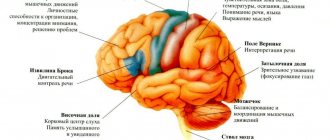Problems of psychology are more relevant than ever for modern people striving to achieve heights in life in the face of fierce competition, regularly changing technological conditions, providing permanent stress. Representatives of the “science of the soul” offer many solutions necessary for the full development of each individual personality. The technogenic-pragmatic world is ready to depersonalize people, turning them into a common gray mass, and in order for a specific person to preserve his individuality, it is necessary to gain a better understanding of the structure of the psyche, the dynamics of the processes occurring in it, taking into account gender-age factors, and the influence of society.
Psychosomatics
At first glance, mental health does not have much impact on physical health. Patients, when visiting a doctor, describe only physical symptoms, without mentioning psychological difficulties. The doctor cannot make a correct diagnosis, treatment is delayed and does not produce results. The physical manifestations of the disease will not go away until the true cause, the psychological one, is eliminated.
To understand how nervous tension affects the body, you need to open an anatomical atlas. All organs are connected and united by two systems: circulatory and lymphatic. Normally, all processes function continuously: nutrients enter the body with the blood, and together with the lymphatic fluid they are removed from the body.
But if the psychological balance is disturbed, nervous tension arises. The brain, as an internal manager, triggers a survival mechanism that causes the adrenal glands to produce a stress hormone. In a situation of real danger, this gives a person the strength to run away or fight. The psychological problem is not perceived as an objective danger, the person remains tense and the excess hormones are not consumed. Gradually, the stress hormone interferes with the functioning of the brain, digestive and cardiovascular systems.
The somatic manifestation of the disease is the presence of symptoms in the absence of a physiological cause. Wandering pains, muscle spasms, swelling, migraines, a sudden attack of allergies - all these signs can be somatic. If tests and ultrasound do not help find the cause of the malaise, you need to consult a psychologist.
Collected a lot of unnecessary things
There are people who just love to collect things or hang on to them, even if they are broken objects. Most likely, you have seen such houses with old knick-knacks, broken dinnerware sets, non-working clocks, old or broken furniture on the balcony, and faulty bicycles.
On the plus side, this may indicate a person who is conservative by nature and doesn't like to change things. The meaning of this habit is an attempt to hide from change. But in the worst case, a person can become a hoarder, bringing useless garbage into the home to add to the clutter. It also indicates a compulsive and neurotic disorder.
Basic psychological problems of interpersonal nature
1. Pathological attachment to a loved one, jealousy, inability to forgive betrayal.
2. Loneliness, depriving psychological well-being.
3. Disadaptation in the team, inability to establish productive relationships with friends, colleagues, and superiors.
4. A person’s concern about the assessment of others, the experience of his own inconsistency with the put forward requirements.
5. Difficulties in establishing mutual understanding with representatives of another generation, when “fathers” do not find a common language with “children.”
6. Gender problems that arise in both hetero- and mono-sex social groups, associated with differences in the psychology of men and women.
Psychoanalyst Adler's Study
According to classical Adlerian psychology, feelings of inferiority arise again when adults want to achieve some unrealistic goal or feel a constant need for improvement. Stress associated with feelings of inferiority causes a pessimistic attitude towards life and an inability to overcome difficulties. According to Adler, every person, to one degree or another, has a feeling of inferiority, but this is not a disease, but rather a stimulator of healthy, normal aspirations and development. It becomes a pathological condition only when the feeling of inferiority suppresses the personality, and does not stimulate him to useful activity. The complex makes the individual depressed and incapable of further personal development.
The habit of hiding your junk
When you first enter these people's home, the apartment may seem nice and clean. Everything seems to be in its place, books are organized and orderly on the shelves, the room is covered with fresh wallpaper. But you need to look in the closets. They will be dirty and full of garbage, crumpled and unkempt clothes, and broken objects. In general, the clutter in the house is simply hidden.
This is typical for dramatic personalities.
The way things look on the outside is more important to these people. They prefer to do something only to make the right impression on others, they like to show only their good side
Such people usually do not get rid of old things, nor do they maintain order, but prefer to hide it. For them, an attractive looking home is more important than a truly clean home.
“No money”: I often said this to my children when they asked for something. Now I regret it
All the negative emotions that I woke up with go away after 10 minutes of stretching
How to make a new kitchen apron from plywood yourself: an easy way
Accelerated pace of life
People began to cover long distances in a short time, which means that they are more likely to engage in any type of activity. Scientific development has made it possible to save time on some things, but at the same time it has also given the opportunity to spend the saved time on others. In the modern world, dependence on computer games and social networks is growing. And in this way, people only increase the stress on the psyche instead of resting; the brain is increasingly overloaded. This is confirmed by many psychological studies. Psychological problems caused by the fast pace of life in society are a real scourge of our time, psychologists say.
We should not ignore the painful signals of our psyche and engage in the prevention of psychological disorders. If there is no way out of a problematic situation, then it would be optimal to simply switch to something distracting and more useful. Sometimes an excellent solution to psychological problems is to visit a psychologist.
The sink, laundry basket, or trash can may be full
Not many people can say that they enjoy cleaning. Some people dislike it to the point that they are intimidated by the prospect of washing clothes and dishes. In such houses, garbage collects on the balcony, dishes in the sink, and the laundry basket is always overflowing.
Such people love procrastination, which is common to many. This may manifest itself in their daily tasks. Some people find it more convenient to do a little each day rather than all at once. There are also those who often justify their doing nothing with lame excuses, such as “no time,” “laziness,” or “I’ll do it tomorrow.” Procrastination is terrible, and if you are prone to it, then at least start doing something. Wash your plates immediately after eating or throw away your trash every day. These things develop healthy habits over time until you go into automatic mode.
Treasure from an old attic: the artist found archival photographs from 1955-1973.
Mom taught me how to make accordion bread with pesto sauce: a simple recipe
Ghostbusters is based on Dan Aykroyd's mystical experiences.
Always dirty bathroom
A clean bathroom with a pleasant smell is the perfect place to relax. A hot bath in a clean room can help you relieve stress and improve your mood. Herbal salts and essential oils can even normalize skin health and internal organ function. The condition of the bathroom shows how a person cares about his body and his psychological comfort. A clean room with good quality shower gels, oils, creams, body lotion and toothpaste is a sign that the owner of the house enjoys taking care of himself.
If there is only a razor and some soap in the bathroom, this is a clear sign that the person is stressed or does not have time to take proper care of themselves.
The problem of choice in the modern world of consumption
To generalize, we can say that a person, having satisfied his basic needs, tries to direct his forces to satisfy higher psychological and social desires. At this moment we are faced with modern problems. At the moment there is a huge selection of different goods and services. The selection criterion can be color, appearance of packaging, reviews, price, and not just quality. All products a priori perform their functions, but their differences are made on minor characteristics.
In the future, it is these insignificant properties that are imposed on a person as selection criteria, and this makes people feel doubts when the purchase has already been made. Most people do not have the opportunity to purchase all types of one product, and often they remain dissatisfied due to doubts about the correctness of their choice.
Low self-esteem
The main psychological problem, according to most psychologists, is the low self-esteem of a huge number of people.
Low self-esteem can affect various aspects of a person's life. People with low self-esteem tend to say a lot of negative things about themselves. They may criticize themselves, their actions and abilities, or joke about themselves with sarcasm. People with low self-esteem tend to doubt themselves or blame themselves when they encounter any obstacles along the way. They may also not recognize their positive qualities. When someone with low self-esteem receives compliments, they may simply think that they are being flattered or that their positive qualities are being exaggerated.
These people don't value their abilities and focus on what they haven't done or the mistakes they've made. People with low self-esteem may expect that they will not succeed. They often feel depressed and anxious. Low self-esteem can affect your performance at work or school. People with low confidence achieve less than people with adequate self-esteem because they believe that they are less worthy and capable than others.
This category of people tends to avoid problems, fearing that they will not cope. People who do not value themselves may work very hard and force themselves to overwork because they believe that they need to hide imaginary shortcomings. They have a hard time believing any positive results they receive. Low self-esteem makes a person shy and very shy, not believing in his own abilities.
Types of psychological problems
There are dozens of types of neuroses, syndromes, and disorders. It is not possible to list them all
Let us draw attention to the main socio-psychological problems of the individual, the relevance of which is noted by modern experts (current requests in the psychologist’s office):
- complexes;
- low self-esteem;
- diffidence;
- phobias;
- indecision;
- impulsiveness and unpredictability;
- tired of life;
- increased anxiety;
- loneliness;
- betrayal and conflicts in the family;
- dependence on other people's opinions;
- pathological attachment, falling in love;
- addictions;
- depression;
- crises;
- destruction (self-destructive behavior);
- dysmorphophobia (non-acceptance of one's appearance).
In a broad sense, the following groups of conflicts can be distinguished:
- difficulties in the field of communications;
- family troubles and family crises;
- age-related crises, for example, during the teenage crisis, the risk of behavioral disorders increases;
- failures in the labor sphere;
- difficulties in interacting with the opposite sex;
- complexities of personality development and formation.
In psychology, there is no generally accepted classification of types of psychological problems. Let's look at some of them. What are the psychological problems and difficulties:
- By level of manifestation: cognitive, emotional, behavioral.
- By their nature: primary (the cause of other disorders) and secondary (the consequence of other difficulties).
- By time of manifestation: old, new and chronic.
By nature, difficulties can be obvious or unobvious. The subject guesses about the presence of the former. If we are talking about hidden conflicts, then a person, as a rule, does not notice them. For example, few people understand that they are programmed for self-destruction. In this case, there seems to be no conflict, because the person himself is not aware of it, but in fact there is a contradiction.
A specific type is contrived difficulties. This is similar to hypochondria: a person invents symptoms for himself, makes diagnoses and believes in it.
Inferiority complex
An inferiority complex is an extreme pathological degree of self-doubt and is a huge psychological problem for a person. In essence, it is a lack of self-worth, doubt and very low self-esteem, as well as a feeling of inability to live up to standards.
It is often subconscious and it is believed that people suffering from this complex try to compensate for this feeling, which is expressed in high achievements or extremely antisocial behavior. In modern literature, it is preferable to call this psychological phenomenon “lack of hidden self-esteem.” The complex develops through a combination of genetic characteristics of the individual and upbringing, as well as life experiences.
An inferiority complex can increase when feelings of inferiority are triggered by failure and stress. Individuals at risk for developing the complex typically exhibit signs of low self-esteem, have low socioeconomic status, and also have symptoms of depression.
Children raised in environments where they were constantly criticized or did not live up to their parents' expectations may also develop an inferiority complex. There are many different warning signs for those who may be more prone to developing an inferiority complex. For example, someone who is attracted to attention and approval may be more receptive.
Diagnosis of mental state
The cause of a psychological problem can only be determined through personal consultation with a specialist. Psychologists use several search methods:
- Conversation. Diagnosis begins with this. It is usually not possible to find a problem during the first conversation, but the psychologist notes which area of life the client is reluctant to talk about and then works with it.
- Tests. Various questionnaires, graphic techniques, and free choice tests help to identify hidden experiences and evaluate worldview.
- Observation. It is carried out within a hospital, emergency room or simulated problem situation. A psychologist observes how a person behaves, how he speaks, gestures, and in what position he stands or sits. Gestures are almost impossible to control and can reveal information about a person's self-perception and worldview.
- Hypnosis. If the patient is secretive, the psychologist puts him into a state of hypnosis. This allows you to identify repressed memories and get to experiences that the patient ignores.
Having identified what caused the development of the problem, the psychologist selects a suitable means of therapy:
- consultations (individual and group);
- therapeutic games;
- toning and relaxation exercises;
- art therapy, creative exercises, color and sound therapy;
- fairytale therapy, record keeping.
The duration of treatment and the need for more serious medications are selected individually. At the same time, the psychologist is engaged in education, increasing the patient’s level of awareness.
Where to start treatment
If you suspect the development of a mental disorder, the help of a psychiatrist is required. At the appointment, after a thorough examination, the doctor chooses how the patient will receive treatment:
- outpatient;
- in hospital;
- dispensary registration.
According to Article 29 of the Criminal Code of the Russian Federation, a patient can be hospitalized without the consent of him and his relatives in a hospital if his condition causes:
- harming oneself and others;
- inability to perform basic self-service actions;
- deterioration of the condition if the patient is not hospitalized.
Previously, treatment of the mentally ill was not distinguished by humanism and delicacy. For example, in 1936, the Portuguese doctor Egas Moniz proposed a method of lobotomy. That is, the removal of some parts of the brain. After 20 operations performed, he announced the results. seven experimental subjects were completely cured of mental illness, another seven showed noticeable improvements. For the rest, the condition remained at the same level.
Surprisingly, this method has gained great popularity, and its author was even awarded the Nobel Prize in Medicine.
Currently, therapy for the mentally ill is carried out in several directions and has a more gentle approach:
- pharmacotherapy;
- psychotherapy;
- social rehabilitation.
Interpersonal conflicts
Another area that is studied by both practical and scientific (theoretical) psychology is various kinds of conflicts.
Open and unobvious conflicts with other people are harmful to a person’s mental activity and represent a serious problem of a socio-psychological nature. These conflicts can be classified:
- Family conflicts (different values, problematic relationships with children, sexual dissatisfaction, feelings of misunderstanding and resentment, betrayal, divorce).
- Conflicts in the workplace (conflict situations, emotional stress, chronic fatigue syndrome, stress, dissatisfaction, aggression, the feeling that this interferes with mutual understanding, work and career advancement).
- Conflicts with friends and family (psychological irritation, envy, painful jealousy, resentment).
- Conflicts with strangers (street conflicts, in vehicles, indoors with strangers).
Symptoms
You can suspect the presence of psychological problems by the mental and somatic reactions of the body:
- headache and dizziness;
- nausea;
- loss of appetite (overeating or refusal to eat);
- dyspepsia;
- numbness and icing of the limbs;
- periodic tingling or pain in different parts of the body;
- gastrointestinal disorder;
- sleep problems (insomnia, frequent awakenings, trouble falling asleep);
- apathy and lethargy, especially in the morning;
- chronic fatigue;
- frequent colds;
- exacerbation of chronic diseases;
- chills and tremors;
- sexual dysfunction (decreased desire, impotence, inability to get pleasure, etc.).
Corrective and rehabilitation methods of psychological assistance
Practicing psychologists have a solid arsenal of effective techniques, techniques, methods aimed at successfully overcoming the main psychological problems of clients. The specialized literature notes approximately 450 specific effective approaches. The main ones are:
• multimodal, including analysis of human behavior, interpersonal relationships, sensory processes, imagination;
• transactional, based on Gestalt therapy;
• integrative, following the principle: to each his own;
• ontopsychological, which is based on the so-called existential psychology;
Regardless of the approach and chosen methodology, the process of communication between a specialist and a client has the following 4 stages:
1. Contact. Establishing a trusting relationship between the psychologist and the person contacting him.
2. Monologue-confession of the client. A detailed presentation of his main psychological problems and related experiences.
3. Dialogue-interpretation. Clarifications, questions, tips from the consultant aimed at helping the interlocutor understand himself and lead him to solving pressing problems.
4. Transition from quantity to quality. A certain transformation takes place in the conversation: the specialist’s efforts help the client find a way out of the “life impasse.”
The most important gains received by the client during such consultation are:
• awareness of the causes of one's adversity;
• making a constructive decision;
• the ability to adapt to circumstances that cannot be changed;
• obtaining vital information;
Thus, turning to a qualified specialist can be a turning point in a person’s life. The main result of a conversation with a psychologist will be the habit of closely observing oneself and others. And this is - no less than - the surest weapon against many serious challenges of fate.
Social causes of major psychological problems
Social causes of psychological problems include:
- poverty
- drastic changes in life (change of environment, retirement)
- bad marriage
- military conflicts
- extreme situations
Many people do not notice that the subconscious mind guides human actions. In the process of life, people accumulate a lot of negativity in their subconscious, which contributes to the development and manifestation of very serious psychological problems.
Factors that contribute to the development of problems include: stress, alcohol, addiction, envy. People with such qualities are usually very irritable, afraid of the opinions of society, touchy and almost unable to adapt to new conditions.
Maslow's pyramid of needs
From the perspective of the pyramid of needs of the great American psychologist Abraham Maslow (a pyramid that shows basic human needs), it is obvious that the issue of safety and food is not relevant for people at the present time. Of course, there are exceptions, but the vast majority of people can feed themselves. Products have become accessible, their variety is great, and safety in society is maintained at a decent level. According to Maslow's theory, if it is possible to satisfy basal needs, then a desire arises to satisfy higher needs, such as community or to feel part of a social group, self-realization, or the desire to realize oneself as a specialist, as an individual. It is at the stage of satisfying higher needs that the main socio-psychological problems of modern society arise.
Concept and essence
In psychology, the concept of “problem” has several meanings. To identify difficulties that are psychological in nature, you need to focus on the root of their occurrence. For a psychological problem, it is internal: it is associated with a person’s idea of the world, himself, and interpersonal interactions.
Psychological problems often have subtle symptoms and interfere with implementation in several areas of life. There are 4 main zones that affect psychological problems:
- Individual difficulties. Closely related to physicality. A person who has disorders in this area often has physical health problems. He has obvious or imaginary flaws in appearance, sexual dysfunction, and may have a disability or chronic illness.
- Subjective difficulties. Associated with the implementation of purposeful actions. People who have problems in this area have a weak will, a low level of intelligence, and they do not have enough motivation for self-development. Subjective problems not only limit opportunities, but also prevent them from looking for ways out of difficult situations.
- Personal difficulties. They prevent a person from being a full-fledged member of society and participating in social life. Such people have low self-esteem and do not feel part of the group.
- Individual difficulties. Associated with self-realization. The most difficult type of problem to understand because it is difficult to describe and classify. Such problems include fears associated with life losses: the sudden death of loved ones, illness, a feeling of emptiness, loss of the meaning of life.
Almost every person has psychological problems, but the level of psychological literacy remains low. Often a person lives with a problem all his life, not realizing that he can get rid of it.
Therefore, it is important to be able to notice the symptoms and get rid of them in time.
Losing the meaning of life
How to prevent the development of mental disorders?
People are susceptible to stress to varying degrees, but even the most resilient need a regular “reset.” To prevent the development of psychological problems you can use:
- Short meditations. This is a real phenomenon in the field of psychology: 5-7 minutes a day are enough to feel the result. Meditation is self-contemplation. You just need to close your eyes and breathe deeply, not paying attention to the surrounding noise. Meditation will help you regain strength in the afternoon and relieve fatigue in the evening. Practitioners claim that it helps not to age longer and maintains mental clarity.
- Grounding. A technique close to meditation, but you don’t need to close your eyes. You need to focus your gaze on some beautiful object. For example, look at a flower or a painting. You should try to prevent extraneous thoughts from arising, thinking only about the chosen subject.
- Keeping a diary. Writing down past events and impressions helps you rethink them and not get hung up on negative emotions.
- Morning pages. A method to relieve obsessive thoughts. Immediately after waking up, you need to write 5-10 pages, writing down everything that comes to mind.
- Water procedures. Washing is not only about hygiene. It has been proven that water calms and energizes. After a difficult day or unpleasant event, you need to take a bath or shower.
Also, the prevention of psychological problems will be maintaining a healthy lifestyle: a sufficient level of physical activity, proper nutrition, maintaining water balance. This is important for both young people and older people.
Ways to solve psychological problems
Psychological problems arise for all people, only some try to resolve them, while others drive them into a far corner.
Human life goes on in cycles, and only a strong person can say that he is able to cope with the problems that come his way.
It is easier to perceive this or that situation if the attitude towards life is correct spiritually.
Psychological problems are solved in several stages:
- goal setting;
- definition of conditions;
- solution planning;
- implementation of the decision;
- checking the final result.
In case of frequent stress and difficult situations, a person has three ways to solve the problem - a fictitious way, an effective way, a compensatory way.
The fictitious path is a regression, a return to those methods that were once tested, but at the moment do not work. The consequence of the fictitious method can be neurosis and even schizophrenia.
An effective way involves choosing development and agreeing to destroy your own ego - this is an attempt to apply new or improved old methods of solving problems. Of course, this requires a lot of willpower and a made decision. In this case, no one promises anything pleasant, but development occurs, the personality is upgraded and the person becomes more adapted to the social environment.
The compensatory method means redirecting libidinal energy to other objects, methods, actions. Experts call it one of the effective methods for solving problematic stressful situations.
Compensation can be positive or negative, i.e. transfer or substitution. With a positive transference, a person directs his energy to creativity, intellectual activity and achieves high results.
Negative compensation is aimed at destroying one’s ego, one’s physical body, which means causing oneself psychological trauma and causing aggression.
All psychological problems are hidden in a person’s head, therefore, in order to cope with them and emerge victorious, you must first recognize the problem, that is, turn your face to the problem, and this is quite difficult to do.
It’s even harder to admit that for a long time you were simply deceiving yourself.
And, finally, if the problem is recognized, then it needs to be solved, and your entire picture of the world needs to be reconsidered.
Although it is difficult, it is possible to solve psychological problems, and this requires perseverance and courage. If there is neither courage nor perseverance, the problem can be hidden back into the unconscious and you can continue to live further, experiencing pain and torment.
Still haven't found the answer to your question?
Just write what you need help with
Pathological hoarding
This symptom of obsessive behavior consists in a person’s desire to surround himself, sometimes, with completely unnecessary things. Most often, such people keep their numerous “riches” at home. If the apartment has long been turned into a warehouse for storing garbage, old things, unnecessary rubbish, and these stocks are not thrown away, but, on the contrary, are regularly replenished, then most likely the owner of the property has the notorious “Plyushkin syndrome.”
If careful handling of unnecessary things has not yet reached the scale of a natural disaster within a given apartment, we can talk about the conservative character of its owner. Such people are extremely sensitive to changes and try not to disrupt their usual way of life, surrounding themselves with useless, but so familiar things.
Causes of difficulties
A psychological problem is a reaction of the psyche to the external environment, and the cause should be sought not in the person, but in his environment. Factors that make adaptation difficult:
- Mistakes in education. Too much parental control is just as dangerous as indifference. In the first case, the child is deprived of the feeling of himself as an independent person. In the second, he cannot trust his parents, feels unnecessary and lonely.
- High expectations. If a person is successful in his dreams, but in reality he fails to realize himself, he develops narcissistic disorder. It often develops in adolescents and becomes the cause of drug addiction, aggression, and loss of contact with reality.
- Being in a dangerous situation. When a person finds himself in a situation that poses a real threat to life (for example, in a war zone), the psyche mobilizes all resources and is quickly depleted. If you manage to get out of the situation, PTSD develops - a disorder in which a person re-experiences the emotions that he experienced during the danger. Without treatment, this can lead to the development of paranoia and schizophrenia.
Children's difficulties
Psychological problems in children arise at different periods of their lives. They are of different nature. These may be the following difficulties:
- children's aggression and impulsiveness;
- isolation;
- moodiness and tearfulness;
- timidity and shyness;
- low self-esteem;
- high level of anxiety;
- increased sensitivity;
- stubbornness;
- fears and all kinds of phobias;
- inattention;
- difficulty remembering information;
- various problems of psychological development;
- poor performance at school;
- difficulties with adaptation to a school or kindergarten;
- problems communicating with peers and adults;
If any kind of psychological difficulties arise, it is necessary to seek advice from a child psychologist, since the child’s psyche is a very fragile structure.










